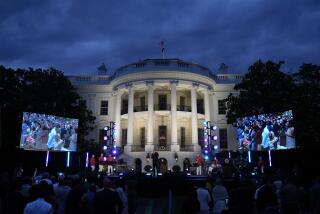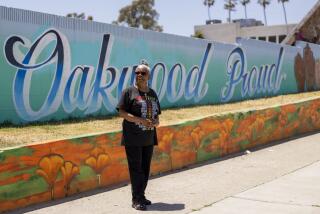Op-Ed: Juneteenth celebrates an illusion of the liberation of Black people. I was raised on this reality

- Share via
Today, Black communities around the country are celebrating Juneteenth, a holiday marking June 19, 1865, the day Union troops arrived in Galveston, Texas, to enforce the Emancipation Proclamation that had abolished slavery more than two years before. The holiday is ingrained in Texas and Southern culture and is recognized in 47 of the 50 United States.
But this year’s celebration is different: It comes as America wakes up to the fact that the liberation of Black people is incomplete.
As a Black child, I was raised on this reality. When my father believed his middle-class children had forgotten the skin we were in, he would warn, “You all think you are free.” He was born in rural Mississippi during the Great Depression. The state was careless with his life from the beginning, failing to even record his name, Joseph Nathaniel Winfrey; instead his birth certificate read “Boy.” He grew up with his parents and nine siblings on 350 family-owned acres in the tin-roofed house they built. Life revolved around cotton.
There was little racial violence in pre-civil rights Kilmichael, Miss., not because white folks were benevolent, my father says, but “because Black people followed the separate but unequal rules. People went along with the system and we survived within the system.” There were rules for staying alive, “same as we teach Black children today how to act” to try to “survive the police.”
Some of those rules were: Never go to a white person’s front door — only the side. Always enter the town movie theater from the alley and sit only in the balcony. Do not exercise your right to vote. Send your children to the one-room school for Blacks with the hand-me-down books. “When I was taking algebra,” my father remembers, “I got to a certain page and had to borrow someone else’s book because my pages were torn out.”
The most important rule was that whiteness was supreme and demanded deference. My grandfather tipped his hat to white men and called them “Mr.” In return, they called him “’Lonzo,” for Alonzo. “White folks wouldn’t go to church with you when you were living,” Daddy says, but sometimes, “If they liked you, they might come to your funeral.”
Black people still have rules to survive the racist system that limits our liberty. Our lack of freedom looks different from that of our forefathers and mothers, but it is bondage just the same.
White Americans still demand deference. A Black birdwatcher cannot ask a white woman to leash her dog without the threat of arrest. Racially motivated laws that restrict access to voting and aggressive voter purging threaten Black Americans’ right to participate in the civic process. More than 65 years years after Brown vs. Board of Education, our public schools remain largely separate and unequal, leading to vast gaps in achievement.
In the midst of today’s COVID-19 pandemic, Black Americans are three times more likely to die from the disease than white people. One in three Black men will do prison time, and Black girls are the fastest-growing segment in the juvenile justice system. Black people are 2.5 times more likely to be killed by police than their white counterparts.
Just weeks ago, a quarantined nation watched a Black man, George Floyd, slowly die under the knee of a white Minneapolis police officer and the indifferent gaze of his colleagues. For hundreds of years, America has not cared to change the racist system that resulted in Floyd’s killing. But it did watch his funeral.
This is liberation?
Since 1865, Black people have been gaslighted. America has gripped our chains and, in a cruel sleight of hand, pretended its fists were empty. Black freedom is, in the words of Harlem Renaissance writer Ralph Ellison, a “gaudy illusion.” Juneteenth is more illustrative of the enduring hope of an oppressed people than an observance of Black emancipation.
My father recalls of Black life in the Jim Crow South, “We didn’t give a lot of thought to the fact that we were not free; we just knew that we were not.” African Americans still know this. So we scream, march, demand and hope.
Over recent weeks, corporations and media conglomerates have admitted their complicity in systemic racism. The country is reconsidering policing, an institution that grew in the South from a desire to protect the slave system and human chattel. Monuments to Confederates and racists are coming down. And American streets are teeming with protesters chanting, “Black Lives Matter.”
“I’ve never seen so many white people marching, and I’ve been watching these things for a long time,” my father, now in his 85th year, tells me. “Change is coming, I think.”
This could be true. America may be ready to trade white supremacy for Black equality. Or this moment could be more gaudy illusion. The country rarely misses an opportunity to disappoint its Black citizens. Less than a week after George Floyd was laid to rest in Houston, police shot and killed Rayshard Brooks, another unarmed Black man, in Atlanta, after responding to a complaint that he had fallen asleep in line at a Wendy’s drive-through.
More Black death. More oppression. More constriction.
America loves a performance — especially a staging of democracy. But florid corporate statements never freed anybody. Performance is not policy. Yet Black men who grew up picking cotton, calling white men “Mr.” and reading torn books, remain hopeful. Maybe today America is ready to make good on that hope with real emancipation and freedom for all.
Tamara Winfrey-Harris is the author of “The Sisters Are Alright: Changing the Broken Narrative of Black Women in America.”
More to Read
A cure for the common opinion
Get thought-provoking perspectives with our weekly newsletter.
You may occasionally receive promotional content from the Los Angeles Times.










